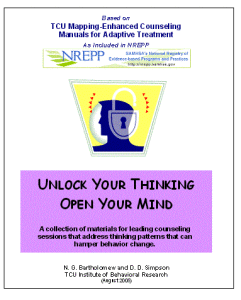
About this intervention
TIC-Criminal Thinking includes 4 sessions aimed at addressing the ingrained pattern of criminal thinking. Individuals involved in a lifestyle steeped in drug use and other criminal activity are likely to return to the community and continue making poor decisions based on their thinking errors. Joe, Rowan-Szal, Greener, Simpson, and Vance (2010), however, have reported that the negative effects of criminal orientations and thinking can be offset by establishing higher levels of therapeutic engagement during treatment. In this module, therefore, participants are introduced to various types of mind traps and are challenged to address destructive thinking patterns. Discussions driven by the intervention lead participants towards breaking out of distorted thinking and irresponsible behavioral cycles while striving toward the goal of incorporating recovery-appropriate thoughts, actions, and habits. The intervention sections include Feelings, Thoughts, and Mind Traps, Road Block to Healthy Thinking, Thinking and Behavior Cycles, Mapping Worksheets, and Links of Interest.
Modular applications in this intervention include:
- Feelings, Thoughts, and Mind Traps was developed as ancillary material to the Straight Ahead: Transition Skills for Recovery intervention developed at TCU. This session features a leader’s script, with notes, worksheets, and handouts for leading a discussion on the interplay of feelings, thoughts, and “mind traps” (i.e., cognitive distortions) that can threaten recovery. Participants are invited to think about how they know the difference between what they are feeling and thinking, and how feeling-based distortions can get in the way of productive communication. Materials for a “mini-lecture” highlight common mind traps and introduce ideas for recognizing them and changing thinking patterns.
- Road Block to Healthy Thinking was developed as ancillary material for the Straight Ahead: Transition Skills for Recovery intervention developed at TCU. This session features a leader’s script, with notes, worksheets, and handouts for leading a discussion about how the use of thinking errors (“cognitive distortions”) can interfere with healthy thinking if left unchecked. Participants are introduced to common thinking patterns that lead to frustration, distortion, and avoidance of personal responsibility. Materials for a “mini-lecture” highlight healthy and unhealthy “ways of thinking” (WOT) and teach participants strategies for recognizing and challenging thinking errors.
- Thinking and Behavior Cycles was developed at TCU for the CJ-DATS project. This session features a leader’s script, with notes, worksheets, and handouts for leading a discussion on the nature of behavior cycles and the interplay of thoughts and feelings that fuel cycles of unwanted behaviors or relapse. Materials highlight the structure of many types of “cyclical” behaviors and participants are invited to identify the thinking patterns associated with their own previous cycles of drug abuse and/or criminal activity and to plan strategies for interrupting future cycles before they begin.
- Mapping Worksheets — These Mapping Worksheets were selected from the intervention TCU Guide Maps: A Resource for Counselors because of their specific focus on anger and emotional regulation. Each mapping worksheet follows a “fill in the blank” format to encourage participants to consider various cognitive aspects of how we respond to feelings. Once participants complete their worksheet, group discussions and commentary on the causes and effects of their specific focus on thoughts and actions.
- Links of Interest — Websites featuring materials on thinking errors.
The Unlock Your Thinking, Open Your Mind intervention may be freely used for personal, educational, research, and/or information purposes only. Permission is hereby granted to reproduce and distribute copies of content material (except reprinted passages from copyrighted sources) for nonprofit educational and nonprofit library purposes, provided that copies are distributed at or below costs and that credit for author and source are included on each copy. No part of any material may be copied, downloaded, stored in a retrieval system, or redistributed for any commercial purpose without the expressed written permission of Texas Christian University.
Recommended Citation: Bartholomew, N. G., & Simpson, D. D. (2005). Unlock your thinking, open your mind. Fort Worth: Texas Christian University, Institute of Behavioral Research. Available: the IBR Website: www.ibr.tcu.edu